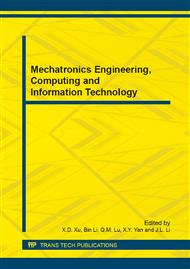[1]
Tsai Jianping, Zhang Xinggang, Xu Yaping, Zhou Wenying. Survey of foreign language audio-visual status of some institutions and Prospects[J]. Foreign Language Teaching, 2011 (1): 43-45.
Google Scholar
[2]
He Gaoda. Modern educational technology and modern foreign language teaching [M]. Nanning: Guangxi Education Press, 2008: 212-218.
Google Scholar
[3]
Luo Mingdong, He Xueren, Li Zhiping, Xie Jili. Educational technology foundation - modern teaching theory and IT Integrated exploration [M]. Science Press, 2009: 7.
Google Scholar
[4]
Xue Yuyue. Autonomous learning [M]. Sichuan Education Press, 2010: 46-48.
Google Scholar
[5]
Zhang Xiaoli, Zheng Yingli, Feng Xiuqi. Collaborative learning network system design patterns [J]. 2009 (3): 36-39.
Google Scholar
[6]
Wei Naixing, Zhou Junying. On the ESP and College English Teaching [J]. Foreign language profession, 2009 (2) : 32-36.
Google Scholar
[7]
Gao Linjun. English autonomous learning [J]. Learning Newspaper &Teacher Edition 2011(12): 38.
Google Scholar
[8]
Shu Dingfang. Foreign language teaching reform, problems and countermeasures [M] Shanghai: Shanghai Foreign Language Education Press, 2009: 315-320.
Google Scholar
[9]
Yan Wenya. Chongqing Education College English major college students learning needs analysis and basic English courses discussion [D] Chongqing Institute of Education, (2009).
Google Scholar
[10]
Rong Fengjing. On autonomous learning of English culture strategy [J] Science and education journal, 2007(12): 23-26.
Google Scholar
[11]
Cheng Yumin. Foreign language education reform in the WTO accession situation[J] International Studies, 2011(6) : 10-12.
Google Scholar
[12]
Zhai Lixia, Zhang Caixia. Interdisciplinary education mode and foreign language graduate academic innovation [J] Shandong Foreign Language Teaching, 2008(2) : 56-58.
Google Scholar
[13]
Robison.P. ESP Today:a Practioner's Guide"[M]. UK:Prentice Hall,2007: 1127-1129.
Google Scholar
[14]
Krueger,M. & F. Ryan. Resituating foreign language in the curriculum[A]. MA:D.C. Heath, 2005: 45-49.
Google Scholar
[15]
ALCHIAN A.DEMSETZ H.Production,information costs and economic organization[J]. American Economic Review, 1972. 62(5): 777-795.
Google Scholar
[16]
Tian Ying, Pu Yongjian. Teamwork incentives analysis [J]. Journal of Industrial Engineering and Engineering Management, 2005 (2) : 133-135.
Google Scholar
[17]
Cheung Hong, Li Jingzi, Yao Yuanyi. The university research team knowledge sharing: a theoretical analysis [J]. Journal of Systems Management, 2010 (4): 121-128.
Google Scholar


